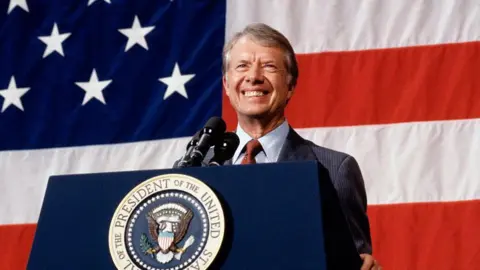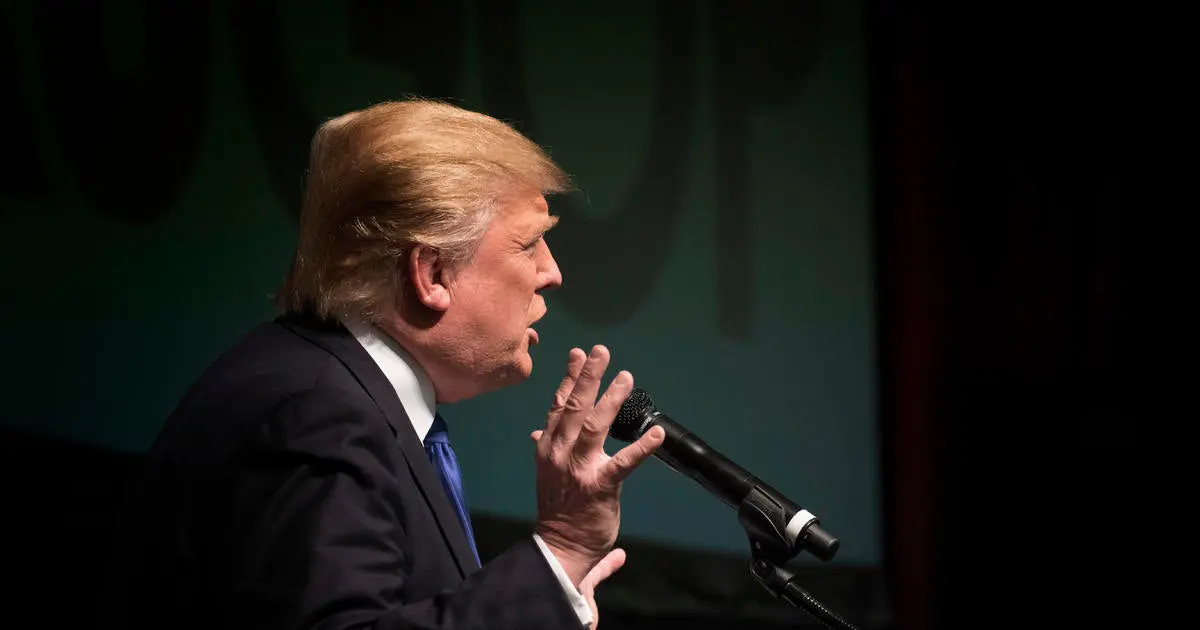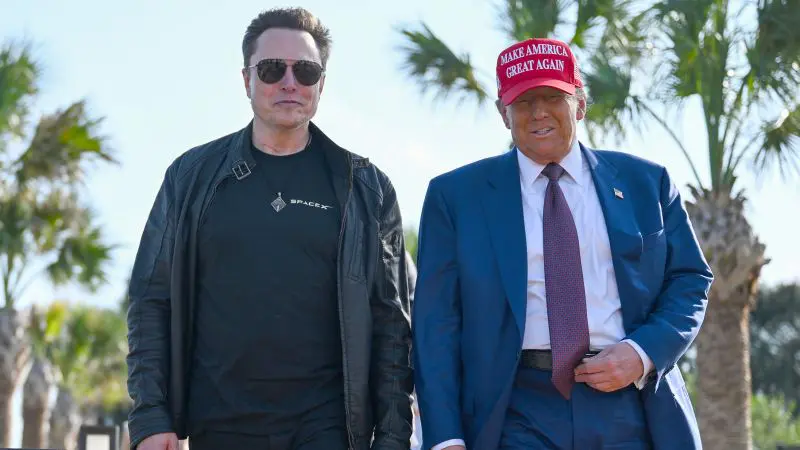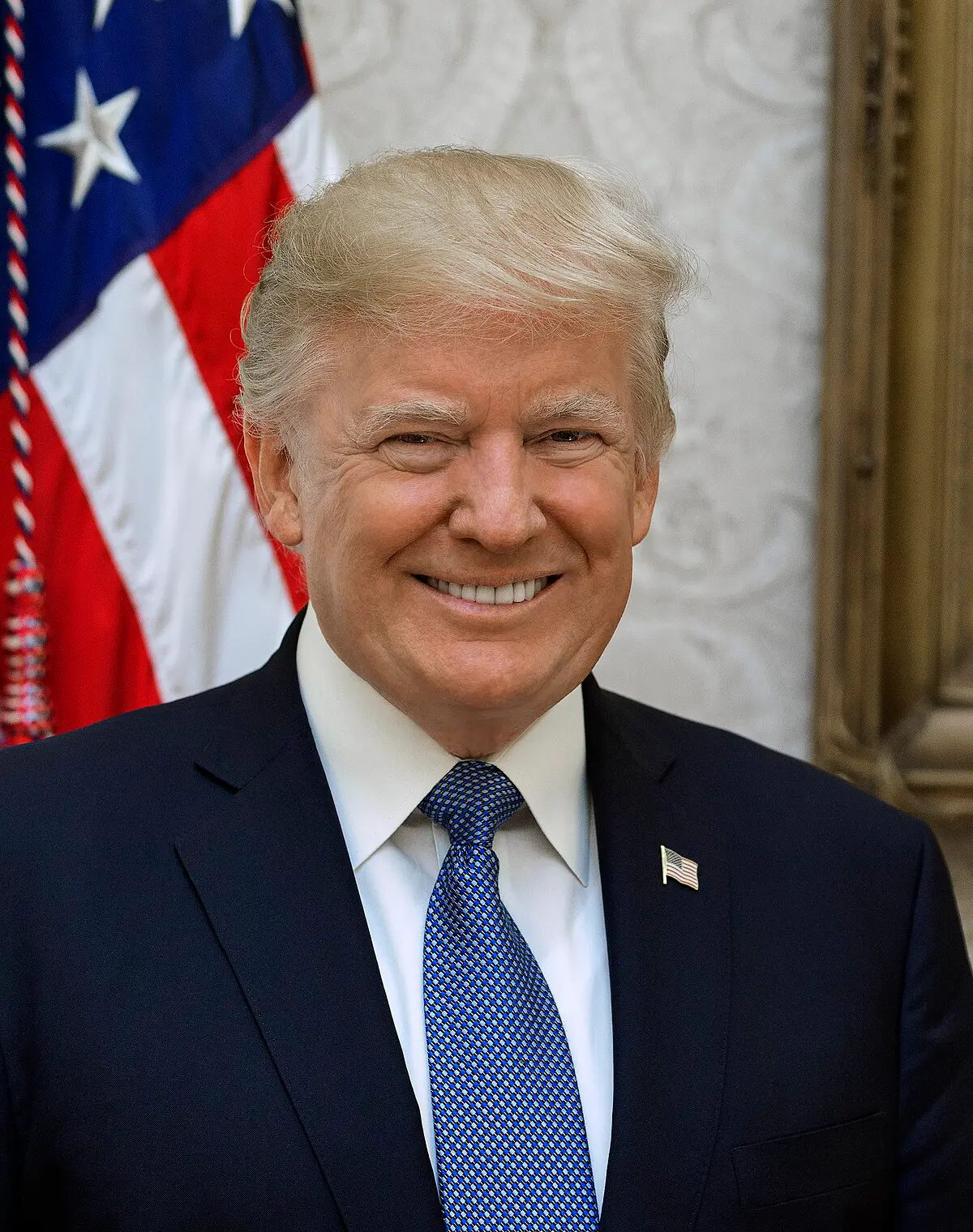Biden and Trump lead tributes to 'extraordinary' Jimmy Carter after death

Joe Biden and Donald Trump have led tributes to former US president and Nobel Peace Prize winner Jimmy Carter, who has died aged 100.
Carter, who lived longer than any president in history, died on Sunday afternoon at his home in Plains, Georgia.
Biden described his fellow Democrat as "a man of principle, faith and humility," while Trump said all Americans owe Carter a "debt of gratitude".
Carter rose from a peanut farmer to become president in 1977, before being forced out of the White House after just one four-year term when Ronald Reagan stormed to victory in the next election.
After leaving the White House with low approval ratings, his reputation was restored through humanitarian work which earned him the Nobel Peace Prize.
"Today, America and the world lost an extraordinary leader, statesman and humanitarian," President Biden and First Lady Jill Biden said in a statement.
"To all of the young people in this nation and for anyone in search of what it means to live a life of purpose and meaning - the good life - study Jimmy Carter, a man of principle, faith, and humility," they added.
"He showed that we are great nation because we are a good people - decent and honorable, courageous and compassionate, humble and strong."
Biden announced that a national day of mourning would take place on 9 January, with Americans encouraged to visit places of worship to "pay homage" to the late president.
He also ordered flags to be flown at half-mast at all public and military buildings for 30 days, a period which includes the inauguration of president-elect Trump.
Trump posted on Truth Social: "The challenges Jimmy faced as president came at a pivotal time for our country and he did everything in his power to improve the lives of all Americans.
"For that, we all owe him a debt of gratitude."
Trump previously mocked Carter's single term on the campaign trail ahead of his victory in this year's presidential election, and said in 2019: "He's a nice man. He was a terrible president."
This came after Carter called Trump an "illegitimate president", claiming he was helped into the White House by Russian interference in the 2016 election, something Moscow and Trump deny.
World leaders also paid tribute to Carter.
King Charles III said "his dedication and humility served as an inspiration to many, and I remember with great fondness his visit to the United Kingdom in 1977".
UK Prime Minister Keir Starmer said Carter was "motivated by his strong faith and values" and that he "redefined the post-presidency with a remarkable commitment to social justice and human rights at home and abroad".
Ukrainian President Volodymyr Zelensky said Carter "was a leader who served during a time when Ukraine was not yet independent, yet his heart stood firmly with us in our ongoing fight for freedom".
French President Emmanuel Macron said he had been a "steadfast advocate for the rights of the most vulnerable and has tirelessly fought for peace".
Before becoming president in 1977, Democrat Carter was governor of Georgia, a lieutenant in the US navy and a farmer.
Carter's presidency will be remembered for his struggles in dealing with acute economic problems and several foreign policy challenges, including the Iran hostage crisis, which ended with the deaths of eight Americans.
There was, however, a notable foreign policy triumph in the Middle East when he helped broker an accord between Egypt and Israel, signed at Camp David in the US in 1978.
But that seemed a distant memory two years later, when voters overwhelmingly chose Republican Ronald Reagan, who had portrayed the president as a weak leader unable to deal with inflation and interest rates at near record highs.
Carter lost the 1980 election by a landslide, winning only six US states plus Washington DC.
After leaving the White House, he became the first and only president to return full-time to the house he lived in before politics - a humble, two-bedroom ranch-style home.
He chose not to pursue the lucrative after-dinner speeches and publishing deals awaiting most former presidents, telling the Washington Post in 2018, that he never really wanted to be rich.
Instead, he spent his remaining years trying to address global problems of inequality and disease.
He founded the Carter Center in 1982 to pursue his vision of world diplomacy, and received the 2002 Nobel Peace Prize for his efforts with the foundation to promote human rights around the world.
He also teamed up with Nelson Mandela to found The Elders, a group of global leaders who committed themselves to work on peace and human rights.
Carter is survived by his four children, 11 grandchildren and 14 great-grandchildren.
His wife, Rosalynn, who he was married to for 77 years, died in November 2023.
Announcing his death, Carter's son Chip said his father was "a hero, not only to me but to everyone who believes in peace, human rights, and unselfish love".
"My brothers, sister, and I shared him with the rest of the world through these common beliefs. The world is our family because of the way he brought people together."
Since 2018 and the death of George HW Bush, Carter was the oldest surviving US president.
Carter stopped medical treatment for an undisclosed illness last year and instead began receiving hospice care at his home. He had suffered from health issues including a melanoma that spread to his liver and brain.
Another leading tribute came from Barack Obama, who reflected on spending time with Carter, saying that "he taught all of us what it means to live a life of grace, dignity, justice, and service".
Maranatha Baptist Church in Plains, where Carter taught Sunday school well into his 90s, "will be a little quieter on Sundays", Obama said.
"But President Carter will never be far away – buried alongside Rosalynn next to a willow tree down the road, his memory calling all of us to heed our better angels."
Former US President Bill Clinton and his wife, former Secretary of State Hillary Clinton, also spoke of Carter's faith.
"President Carter lived to serve others - until the very end," they said in a statement.
Read Trump's statements on Jimmy Carter's death

President-elect Donald Trump issued two statements on Sunday night following the death of former President Jimmy Carter, saying "we all owe him a debt of gratitude." Carter died Sunday at the age of 100.
Trump first posted this statement on Truth Social:
In a separate post about an hour later, Trump wrote:
On the campaign trail, Trump frequently mocked Carter's single term in the White House from 1977-1981, and repeatedly said a variation of comments suggesting Carter was "the happiest man" because he is now "considered a brilliant president by comparison" to President Biden.
Following Carter's death, President Biden, former presidents Obama and Bush, and other U.S. and world leaders issued statements praising Carter's legacy. in remarks Sunday night, Mr. Biden said Carter "lived a life measured not by words, but by his deeds," and added, "We would all do well to be a little more like Jimmy Carter."
What the visa feud says about the coming Trump administration

Donald Trump’s siding with Elon Musk over visas for high-tech workers is the most significant example yet of the president-elect favoring powerful elements in his new MAGA coalition over his base’s anti-immigrant DNA that he twice tapped in his rise to power.
The boiling holiday feud over H-1B visas exposed new fissures across Trump’s broadened support base and reflected the contradictions between his populist ideology and the self-interests of many of the key players in his refashioned inner circle.
After several days of silence over the controversy, the president-elect stepped in, making clear he supported Musk’s argument for recruitment flexibility for the tech industry.
Musk, the richest man in the world, made his case in a series of outspoken posts on X. “The reason I’m in America along with so many critical people who built SpaceX, Tesla and hundreds of other companies that made America strong is because of H1B,” he wrote to one critic on the platform that he owns. “I will go to war on this issue the likes of which you cannot possibly comprehend.”
The visa issue erupted into a full-blown storm following comments by Vivek Ramaswamy, Musk’s co-chair of the Department of Government Efficiency, which Trump has set up to slash the size of federal operations. The former GOP presidential candidate criticized American culture, education standards and children’s TV that he said “venerated mediocrity over excellence for way too long.” The comments came perilously close to an elitist’s disdain for millions of Americans and their culture that Republicans have long accused Democrats of promoting.
On the other side of the debate, Steve Bannon, who served in the first Trump administration, blasted H-1B visas on his “War Room” podcast as a “scam” by Silicon Valley oligarchs that are about “taking American jobs and bringing over what essentially become indentured servants at lower wages.”
H-1B visas allow the brightest foreign workers, many of them engineers and computer scientists, to live and work in the US. Supporters say they’re vital to ensuring Silicon Valley innovation continues to lead the world. The issue has become broader than a mere economic question: because of artificial intelligence and new generation computing, the industry is now critical to US defense and national security.
But some of Trump’s most vocal and committed MAGA supporters have blasted the visas as inconsistent with the America First and anti-immigration philosophy on which the president-elect built his appeal. Some critics of the system also argue that by importing foreign workers, the US government blocks the path to advancement for American workers and college graduates, including minorities.
One case is insufficient evidence to judge whether Trump’s favoring of the Tesla and SpaceX pioneer will set the tone for a presidency over which Musk already holds considerable sway. And Trump defies patterns by acting on his gut and keeping opponents off-balance, so it would be risky to see the H1-B visa issue as a wider metaphor for how the administration will unfold.
However, Musk’s capacity to use X to spread his message, as well as Trump’s eventual blessing for his argument, underscores the huge power he commands as the ubiquitous but unelected sidekick of the president-elect. Earlier this month, for example, Musk came out ahead of Trump and used his platform to help tank a bipartisan funding bill in the House, sending the government perilously close to a shutdown.
His influence could have implications beyond immigration policy. Musk’s vast business before the US government — across multiple sectors of the space industry, electric vehicles and artificial intelligence — could quickly cause multiple conflicts of interest. And he has enormous sway abroad — including in countries like China, where the hawkish views of some of Trump’s top Cabinet picks also risk colliding with the tech mogul’s priorities.
H-1B nonimmigrant visas allow American firms to temporarily employ foreign workers with specialized knowledge and advanced academic qualifications to help them stay globally competitive. Proponents say the system is not intended to replace American workers but to fill vital gaps for specialized workers that the US workforce cannot satisfy. The visas have often been used by South Asian workers nurtured in India’s thriving high-tech industries to come to the United States and build a prosperous diaspora.
In isolation, attempts to expand the H-1B visa program would not seem incompatible with Trump’s hardline immigration policy and promise of a mass deportation of undocumented immigrants to begin soon after he’s sworn in next month.
But nearly two decades of bipartisan attempts to overhaul and solidify the H-1B program have largely failed, often as broad immigration reform plans foundered on the polarization of immigration politics that Trump used to fuel his rise to power in 2016 and again in 2024.
Trump has now made clear he agrees with Musk and said he’d sometimes usedH-1Bvisas in his businesses, although he’s more frequently employed temporary part-time foreign workers on H-2B visas at his golf resorts and hotels.
“I’ve always liked the visas, I have always been in favor of the visas. That’s why we have them,” Trump told The New York Post on Saturday about the H-1B system.
Musk made the case for expanding the program in one of his less explosive posts on X. “We should greatly increase legal immigration of anyone who is hard-working, honest and loves America,” he wrote. “Every such person is an asset to the country. But massive illegal immigration of people we know nothing about is insane.”
Supporters of the South Africa-born immigrant argue that his success in disrupting and reinventing industries like space exploration and low-carbon transportation mean he’s exactly the kind of person who should be at the center of government, innovating in Washington.
But the tech mogul also has clear self-interests in remaining close to the next president, given his billions of dollars in contracts with the US government. And his new position at DOGE ostensibly gives him the capacity to slash regulations that constrain his own ventures.
Musk’s zeal for defending H-1B visas appears to be a signal that he will not shirk from aggressively pushing his agenda when Trump is president. It will be up to the president-elect to decidehow he responds.
Liberal social media pundits delighted in highlighting a “civil war” in the MAGA movement. But there’s nothing necessarily new about a president presiding over feuding parties in his coalition.
Trump, for instance, often seems to invite conflict among his aides. And even President Joe Biden had to manage antagonism between the progressive and more moderate wings of the Democratic Party early in his administration.
In the coming weeks, Trump’s ability to reconcile the differing interests among conservative budget hawks, hardline MAGA lawmakers and comparative moderates who may be vulnerable in 2026 general elections will dictate the fate of his aggressive legislative plans on immigration, budget trimming and tax cuts.
But there’s no modern precedent for a faction of a president’s power base being led by someone as rich, mercurial and powerful as Musk with immediate access to a mighty social media network. Republican lawmakers, for instance, spoke before Christmas about how the phones in their offices suddenly lit up when Musk called for the gutting of House Speaker Mike Johnson’s initial year-end spending bill.
And the Tesla chief’s advocacy for the lucrative high-tech industry on the West Coast feels a million miles away from the economic concerns expressed by Trump’s core supporters and the low-propensity voters in the suburbs who paved his way back to the White House.
The president-elect ran on reducing the price of eggs and bacon after a punishing round of inflation — yet he’s largely chosen a Cabinet of billionaires and millionaires who’ve not had to worry about such matters for years. If Trump’s Cabinet secretaries are as zealous in pursuing their personal goals as Musk is, his administration’s policy may appear inconsistent and out of touch.
The uproar over tech visas also revived one of the transition’s most intriguing questions. How long will Trump tolerate Musk’s capacity to dominate political debate in a way that only he can match? Skeptics are convinced that the president-elect will soon tire of Musk’s ubiquity. Democrats have already tried to fracture their relationship by referring to “President Musk.” And the lesson of Trump’s first term is that those who overshadow him soon find themselves exiting his orbit or becoming a scapegoat when things go wrong.
This may be how things develop. But both Trump and Musk have huge incentives to stick together. Musk will never be able to replicate the inside government perch that he can use to promote his interests. And Republicans will be banking on the SpaceX chief’s financial might as the midterm elections approach after he poured tens of millions of dollars into Trump’s 2024 campaign.
But a deeper reality may postpone a possible schism between Trump and Musk. Each has the capacity to wreak destruction on the other. The president-elect will soon be able to wield the federal government as an instrument of revenge. But someone as social media savvy as Trump, who’s spun falsehoods into a reality to which millions of Americans are committed, would surely balk at making an enemy of the man who controls X.

